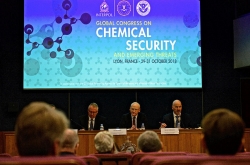The issue
Many chemicals and precursors can be used to make weapons. INTERPOL takes seriously the need to coordinate global efforts to identify and reduce the risk. Project Crimp provides a platform for agencies across different sectors to share knowledge, experience and develop joint responses to the threats.
Chemical security countermeasures
Working with governments, law enforcement agencies and chemical industry partners in our member countries, we have developed a risk matrix of the most significant chemicals of concern. This forms the basis for a tailored programme of chemical security countermeasures, to address national threats from non-state actors.
Communications outreach is essential to bolstering security throughout the lifecycle of chemicals of concern and their precursors.
Training video on weaknesses in the chemical supply chain
Given the complexity of the supply chain – from manufacturing to distribution and retail – chemicals are at increasing risk of being stolen for criminal use.
In response, we produced a video to raise awareness of the potential weaknesses at various points along the supply chain. The video also highlights the need for multi-agency cooperation to share knowledge and find ways to reduce the vulnerabilities.
Entitled ‘The Watchmaker’, the video will be used in a series of INTERPOL capacity building workshops and other activities related to counter-terrorism and prevention.
Project Crimp for Iraqi authorities
Project Crimp was delivered to Iraqi authorities in 2018.
The first part of the training course produced the risk matrix of chemicals of specific concern to the country. It also identified areas of good practice, duplication of effort and potential vulnerabilities, and started to develop the multi-agency team that will oversee future activity.
The second part continued building the working group to implement countermeasures and began the implementation.
Overall, the programme allowed delegates to review their chemical security capabilities. They showcased areas of best practice in Iraq that have been shared with INTERPOL member countries, along with existing countermeasures that assist in safeguarding the people of Iraq.
Raising awareness
Public awareness was a key area of activity. A number of initiatives – such as school visits − have beenwere enhanced to include information about chemical security, and retailers are being reminded about reporting any suspicious activity to government hotlines.
The Civil Defence CBRNE Unit hosted a number of multi-agency simulation days where they showcased their skills in dealing with casualties who have been exposed to dangerous chemicals, and in decontaminating the area to allow a swift return to normality for the community.
Partners
Project Crimp Iraq was delivered in partnership with the INTERPOL National Central Bureau in Baghdad, supported by a number of Iraqi ministries and agencies:
- Ministry of Interior
- Ministry of Environment
- Commission of Customs
- Civil Defense (CBRNE Response Team)
- Directorate of Explosives Control
- Directorate of Criminal Evidence
- Federal Intelligence and Investigations Agency
- National Security Services
- Iraq National Monitoring Agency
Related news

Chemical terrorism: developing a global security network
29 October 2018





